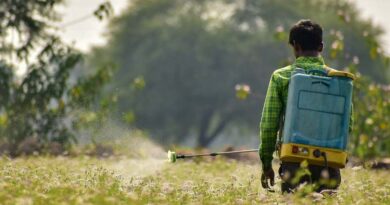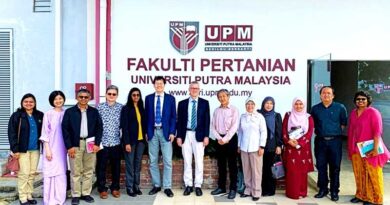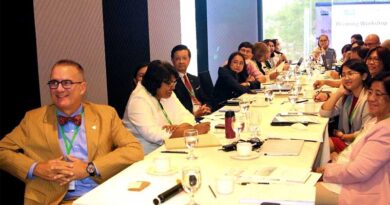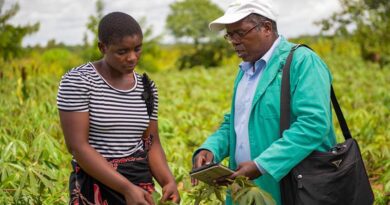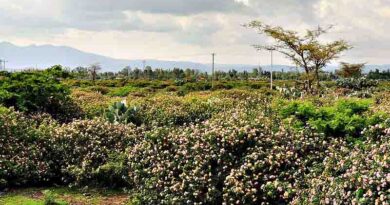Agreement with USDA towards greater regulatory harmonization and collaboration with ASEAN Members
09 March 2023, Asia: CABI has signed an agreement with the US Department of Agriculture’s Foreign Agricultural Service (USDA-FAS) to work in partnership towards greater harmonization and collaboration on regulatory systems in ASEAN member countries.
Michelle Flavin, International Programs Specialist at USDA-FAS, joined Dr Babar Bajwa, CABI’s Senior Regional Director, Asia, in launching the regional cooperation with ASEAN Member Countries to promote work towards greater science-based regulations on pesticide management to tackle a range of crop pests and diseases.
This includes a desire to ensure Maximum Residue Limits (MRLs) on crops are set based on science-based principles and international standards as well as and promote the wider use of biopesticide products in the fight against pests confronting farmers in ASEAN countries.
CABI hosted, in Malaysia for a week-long dialogue, officials from USDA-FAS along with those from CropLife Asia, Food Standards Australia-New Zealand (FSANZ) and eight ASEAN member countries – including Brunei, Cambodia, Indonesia, Malaysia, Philippines, Singapore, Thailand and Vietnam at Putrajaya, with Myanmar joining virtually.
The meeting was convened under the auspice of ‘USDA Cooperation on Global Pesticide Engagement with Economic Communities in ASEAN’ and was held in the presence of honourable guest – Datuk Azah Hanim binti Ahmad, Deputy Secretary General of the Ministry of Agriculture and Food Security of Malaysia (MAFS).
CABI Liaison Officer Mr Fazal Mohd Faizal Harun, Undersecretary International Division of MAFS, also joined the Deputy Secretary General at the launch ceremony.
Datuk Azah Hanim binti Ahmad praised the efforts of CABI, USDA, CropLife Asia, ASEAN member countries, and the ASEAN Secretariat, noting the unique value of partnerships between public, private and not-for-profit organizations to reach common objectives. “Engagement of this nature is the embodiment of collaboration and it is indeed remarkable and welcomed in Malaysia and in ASEAN.” She said.
She encouraged officials from MAFS and the ASEAN member countries to consider this cooperation as an opportunity to share their country needs in terms of MRL and related topics.
“Coordination among regulators and high-level officials in respective countries, and in ASEAN, as a region, is of paramount importance in carrying out science-based assessment when handling and tackling pesticide and MRL concerns, so that policies designed are able to be translated into action,” she said.
Dr Bajwa showed his gratitude to MAFS, the Government of Malaysia and the Malaysian Agricultural Research and Development Institute (MARDI) for their membership support to CABI.
This is particularly in respect of work on biosecurity issues, sustainable crop management and capacity building, climate change, and loss of biodiversity and ecosystem services.
Specifically, the launch event was an opportunity for subject experts to identify the needs of participating ASEAN member countries on MRLs and related technical issues and map out pathways to address respective country needs.
Ms Flavin shared an overview of the USDA-FAS regional cooperation aimed to address the trade barriers between the ASEAN member countries – with a focus on MRL and other related issues.
Furthermore, Timothy Harrison, USDA-FAS Agricultural Counsellor to Malaysia, emphasized US cooperation with Malaysia in the agricultural sector and noted the positive trade relationships between the two countries.
Tracy Hambridge, Acting Manager – Dietary Exposure Assessment and Residues Section at Food Standards Australia New Zealand (FSANZ), shared the role of the agency to ensure that food produced and imported to Australia is safe for the consumer. She also noted the positive collaboration with ASEAN member countries.
Correspondingly, Ricky Ho, Director – Science and Regulatory Affairs at CropLife Asia, said that by implementing this public private partnership we are working towards safe, secure and sustainable food delivery for the communities within ASEAN and throughout the world.
Dr Bajwa said, “This collaborative effort with ASEAN member countries will leverage active work streams in MRL registration, pesticide communication, import MRLs, biopesticides and alignment with international standards in Asia.
“This will ensure greater food security and trade links between ASEAN member countries and the rest of the world.”
Also Read: Indian government to launch Seed Traceability System for good quality seeds
(For Latest Agriculture News & Updates, follow Krishak Jagat on Google News)



